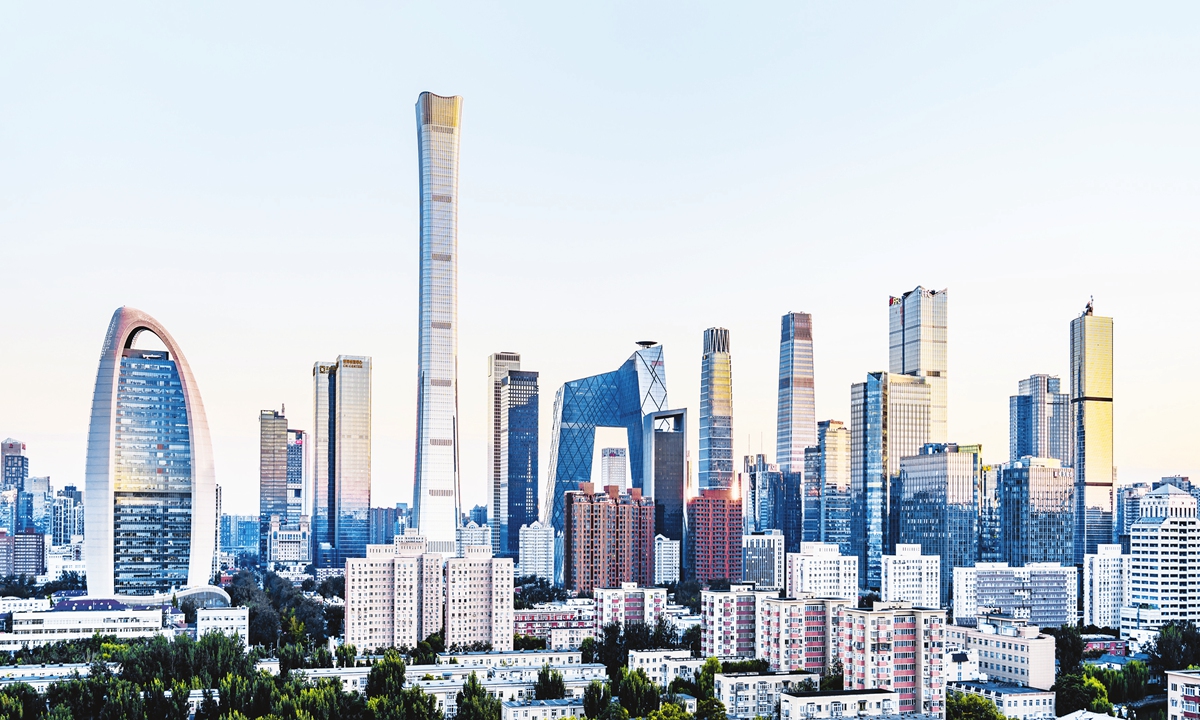
A view of Beijing. Photo: VCG
Editor's Note:Sergi Vicente (Vicente) was formerly a correspondent in China and is currently the director of Beteve in Spain. His 12 years of experience working and living in China let him witness the real scenes of China's rapid development through reform and opening-up. In an interview with the Global Times (GT) correspondent, Vicente said that the "Chinese speed" amazed him, so he often said in his news commentary, "China's change is its constancy, and its constancy is its change."
GT: Can you talk about your experience living and working in China?
Vicente: In 2002, I was invited to teach English at a school in Taiyuan, Shanxi Province in North China. The original contract was only for three weeks, so I booked a round-trip ticket. But as soon as I arrived in Taiyuan, I was fascinated by the local culture and environment, so I found a way to extend my stay in China. Although that return ticket had long been invalidated, I have kept it until now because it records the beginning of my time in China and it also represents a ticket to understanding and appreciating China.
When I returned to Barcelona, I immediately applied to the local television station to be a correspondent in Asia. Soon, I came to Beijing to work and I traveled to various parts of China for interviews. I will never forget my experience interviewing local officials and residents in Xinjiang.
The year 2002 was the Year of the Horse in China. I came to China that year and stayed until 2014. During these 12 years, I witnessed the real scenes of China's rapid development through reform and opening-up. The "Chinese speed" amazed me, so I often said in my news commentary, "China's change is its constancy, and its constancy is its change." At first, Spanish audiences didn't understand the meaning of this statement, so I explained, "When you see the rapid changes in Chinese cities, don't be surprised. Rapid change is the norm nowadays, which means 'constancy.' If you see a place that hasn't changed, that's abnormal; that means 'change'."
GT: You wrote a book called China Fast Forward based on your experiences and observations during your 12 years in China. How did Spanish readers respond to it?
Vicente: Working and living in China is like a mirror that reflects China's tremendous changes. The first edition of the book China Fast Forward had only 1,000 copies, but it sold out shortly after it was published and had to be reprinted to meet the demand. It is understood that Spanish readers can be divided into two categories. The first category is businessmen who want to do business in China. They can learn about the work and life habits of Chinese people from the book, especially the Chinese way of thinking, including the drinking culture and the socializing culture. The second category is students who want to study in China. They are very eager to learn more about China and want to narrow the cultural differences between Europe and China so that they won't feel "unable to understand this or uncomfortable with that" when they arrive in China.
GT: As a Westerner, what Chinese voices and stories would you most like to hear?
Vicente: Hosting various cultural exchange activities, such as film screenings, art exhibitions, photo exhibitions, or lectures, are all good and effective methods. For example, the Asian Film Festival Barcelona, organized by Casa Asia, allows Western audiences to directly understand China through the screen. The same goes for art and photo exhibitions, using an artistic form to interpret China with a sense of both reality and artistry, which is the most persuasive way. In this film festival, Spanish audiences appreciated and admired the storytelling skills of Chinese films.
GT: How can Western audiences understand the truth?
Vicente: To a large extent, it also relies on overseas Chinese communities using various methods, utilizing various channels and personal connections to communicate with the locals and promote and express China's viewpoints and opinions. For example, there are many Chinese community organizations in Spain that can invite people from all walks of life to discuss various topics, even sensitive issues. Local people can express different opinions and views, but they must provide solid factual evidence.
GT: Why did you think of establishing a Chinese program channel?
Vicente: I want to promote the Chinese language in as many ways as possible, which was the original intention of establishing a Chinese channel. In addition, it is to allow overseas Chinese in Spain to timely understand Spain's politics, economy, cultural development and governance measures. The feedback on this Chinese channel has been very positive. Without the timeliness and comprehensiveness of this channel, it would probably take a long time for the Chinese to keep up to date with relevant information, which is the role of the media. This channel has received support and assistance from overseas Chinese community organizations, and I would like to express my gratitude to everyone here.
GT: This year marks the 50th anniversary of the establishment of diplomatic relations between China and Spain. You have repeatedly emphasized during your speech at Casa Asia that China-Spain relations will keep improving. Could you please elaborate?
Vicente: With the development of global economic integration, countries drawing on each other's merits have become one of the models for current world economic development. Just like the thousands of parts in a car, no car company can produce everything on its own. Spain and China should play to their own strengths and engage in trade and technological complementarity. In this regard, I think the current Spanish government has done a good job, especially after the epidemic. There have been frequent friendly engagements between the two countries. In 2021, Barcelona and Shenzhen were officially upgraded from friendship cities to sister cities. Recently, Shenzhen also held the Spain-Shenzhen Trade Conference in Barcelona. These are all driving forces for the economic development of both countries.
GT: What do you think of the Global Civilization Initiative proposed by the Chinese leader?
Vicente: The Chinese leadership has a far-sighted vision, and the Global Civilization Initiative is very forward-looking. In my more than 10 years in China, I have felt the inclusiveness, openness and creativity of Chinese culture. My personal experience has given me a deep understanding of the importance of cultural exchanges and mutual learning.
GT: In which areas do you think Europe and China should cooperate more?
Vicente: I think the most important area is the economy. Chinese inexpensive and good-quality consumer goods and clothing already have an absolute advantage in the Spanish and European markets, but Chinese businesses must be aware of potential risks and be prepared to deal with them. They should continuously explore and innovate and work to this advantage, constantly introduce new products with more technological content to the European market, and use Chinese wisdom to maintain a leading position in this field. As far as I know, companies from countries such as Denmark, Ireland and the Netherlands have started to challenge the Chinese small commodity and clothing markets in the Spanish market, although they are still in the early stages. However, if Chinese businesses become complacent, they may be replaced by these companies.

